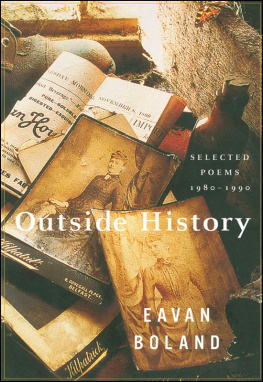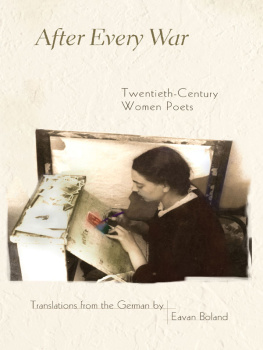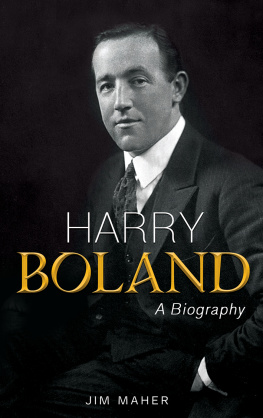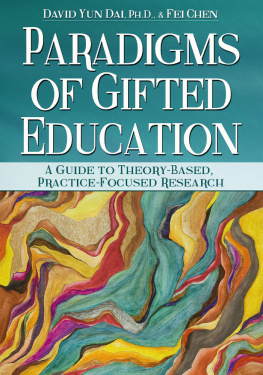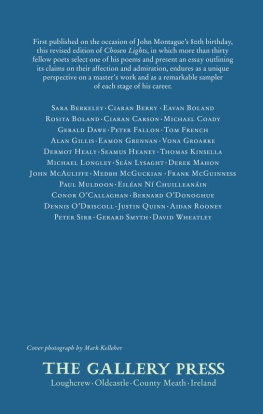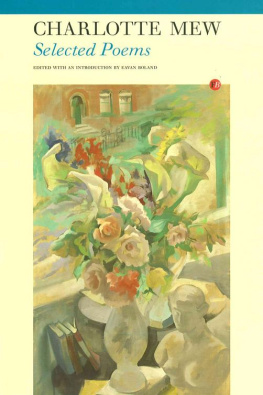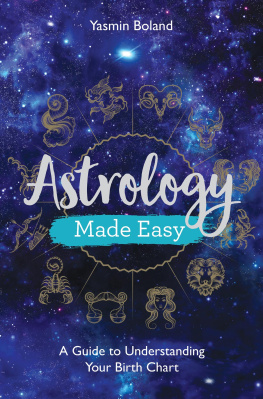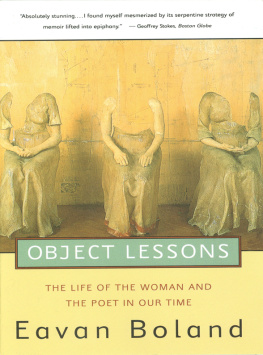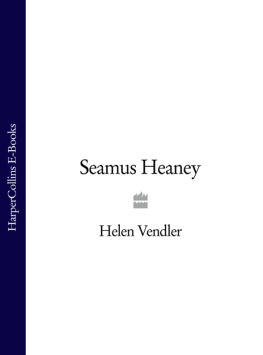Eavan Boland - Outside History
Here you can read online Eavan Boland - Outside History full text of the book (entire story) in english for free. Download pdf and epub, get meaning, cover and reviews about this ebook. publisher: W. W. Norton & Company, genre: Detective and thriller. Description of the work, (preface) as well as reviews are available. Best literature library LitArk.com created for fans of good reading and offers a wide selection of genres:
Romance novel
Science fiction
Adventure
Detective
Science
History
Home and family
Prose
Art
Politics
Computer
Non-fiction
Religion
Business
Children
Humor
Choose a favorite category and find really read worthwhile books. Enjoy immersion in the world of imagination, feel the emotions of the characters or learn something new for yourself, make an fascinating discovery.
- Book:Outside History
- Author:
- Publisher:W. W. Norton & Company
- Genre:
- Rating:4 / 5
- Favourites:Add to favourites
- Your mark:
- 80
- 1
- 2
- 3
- 4
- 5
Outside History: summary, description and annotation
We offer to read an annotation, description, summary or preface (depends on what the author of the book "Outside History" wrote himself). If you haven't found the necessary information about the book — write in the comments, we will try to find it.
An essential volume by one of our most esteemed poets.[Boland is] an original, dazzlingly gifted writer.... Uncompromising intellect, wry perception, and verbal brilliance.... A wonderfully elegant and sensual writer, keenly attuned to the pleasures of form and sound.... Shes as musically gifted and as uncompromisingly intelligent as Seamus Heaney, and deserves comparable attention. David Walker, Field
Outside History — read online for free the complete book (whole text) full work
Below is the text of the book, divided by pages. System saving the place of the last page read, allows you to conveniently read the book "Outside History" online for free, without having to search again every time where you left off. Put a bookmark, and you can go to the page where you finished reading at any time.
Font size:
Interval:
Bookmark:
Thanks also to: The Irish Times; The Sunday Tribune; The New Nation; Gown; The Sunday Times; Poetry Review; Poetry Ireland; Oxford Poetry; Orbis. BBC 2 (television); BBC 3 (radio); RTE (television and radio); BBC Radio 4 (Womans Hour). I wish to thank the Irish Arts Council and The Ingram Merrill Foundation for grants which assisted me in the completion of this work.
Object Lessons II
Outside History III
Distances I
The Journey II
Domestic Interior Copyright 1990 by Eavan Boland. All rights reserved. First published as a Norton paperback 1991; reissued 2001 Printed in the United States of America.
The text of this book is composed in Bernhard Modern and Univers #57 Condensed, with the display set in Carson Condensed. Composition and Manufacturing by The Maple-Vail Book Manufacturing Group. Book design by Antonina Krass. Library of Congress Cataloging-in-Publication Data Boland, Eavan. Outside history : selected poems, 19801990 / Eavan Boland. cm. I. Title. Title.
PR6052.O35098 1990 821.914dc20 90-31754 ISBN 9780393346473 (ebook) W. W. Norton & Company, Inc., 500 Fifth Avenue, New York, N.Y. 10110 www.wwnorton.com W. W. Norton & Company, Ltd., Castle House, 75/76 Wells Street, London WIT 3QT
 It was the first gift he ever gave her, buying it for five francs in the Galeries in prewar Paris.
It was the first gift he ever gave her, buying it for five francs in the Galeries in prewar Paris. It was stiflins. A starless drought made the nights stormy. They stayed in the city for the summer. They met in cafs. She was always early. He was late.
That evening he was later. They wrapped the fan. He looked at his watch. She looked down the Boulevard des Capucines. She ordered more coffee. She stood up.
The streets were emptying. The heat was killing. She thought the distance smelled of rain and lightning. These are wild roses, appliqued on silk by hand, darkly picked, stitched boldly, quickly. The rest is tortoiseshell and has the reticent, clear patience of its element. It is a worn-out underwater bullion and it keeps, even now, an inference of its violation.
The lace is overcast as if the weather it opened for and offset had entered it. The past is an empty caf terrace. An airless dusk before thunder. A man running. And no way now to know what happened then none at allunless, of course, you improvise: the blackbird on this first sultry morning, in summer, finding buds, worms, fruit, feels the heat.
I wonder about you: whether the blue abrasions of daylight, falling as dusk across your page, make you reach for the lamp. I wonder about you: whether the blue abrasions of daylight, falling as dusk across your page, make you reach for the lamp.I sometimes think I see that gesture in the way you use language. And whether you think, as I do, that wild flowers dried and fired on the ironstone rim of the saucer underneath your cup are a sign of a savage, old calligraphy: you will not have it. The chair you use, for instance, may be cane soaked and curled in spirals, painted white and eloquent, or iron mesh and the table a horizon of its own on plain, deal trestles, bearing up unmarked, steel-cut foolscap, a whole quire of it; when you leave I know you look at them and you love their air of unaggressive silence as you close the door. The early summer, its covenant, its grace, is everywhere: even shadows have leaves. Somewhere you are writing or have written in a room you came to as I come to this room with honeyed corners, the interior sunless, the windows shut but clear so I can see the bay windbreak, the laburnum hang fire, feel the ache of things ending in the jasmine darkening early.
It was yours.Your coffee mug. Black, with a hunting scene on the side (cruel theater as the kettle poured). Together, we unpacked it in the new house. A hunting scene: Dogs. Hawking. Silk.
Linen spread out in a meadow. Pitchers of wine clouding in the shadow of beech trees. Buttermilk. A huntsman. A wild rabbit. A thrush ready to sing.
A lady smiling as the huntsman kissed her: the way land looks before disaster strikes or suffering becomes a habit was not a feature of the history we knew. Now it opened out before us, bright as our curtainless October nights whose street-lit glow was second nature. Or those mornings we drank white coffee and shared cake in a kitchen full of chaos, before we knew the details of this pastoral were merely veiled warnings of the shiver of presentiment with which we found the broken pieces of the sparrow hawk and the kisses of the huntsman, the pitcher and the thrushs never to-he-finished aria, an untouched meal, and the lady and the hunting horn on the floorboards you and I had sworn to sand down and seal with varnish.
What you have given me is, of course, elegy: the red-shouldered hawk in among these scattering partridges, flustered at such a descent, and the broad-winged one poised on the branch of a pignut, and the pine siskin and the wren are an inference we follow in the plummet of the tern which appears to be, from this angle anyway, impossibly fragile and if we imagine the franchise of light these camphor-colored wings opened out once with and are at such a loss for now, then surely this is the nature and effect of elegy: the celebration of an element which absence has revealed. It is our earthliness we love as we look at them, which we fear to lose, which we need this rephrasing of the air, of the ocean to remind us of: that evening, late in May, the Clare hills were ghostly with hawthorn. Two swans flew over us.I can still hear the musical insistence of their wings as they came in past the treetops, near the lake; and we looked up, rooted to the spot.
Outside my window an English spring was summoning home its birds and a week-long fog was tattering into wisps and rags and at last I could see the railings when I looked out. I was a child in a north-facing bedroom in a strange country. I lay awake listening to quarreling and taffeta creaking and the clattering of queens and aces on the inlaid card table. I played a game: I hid my face in the pillow and put my arms around it until they thickened. Then I was following the thaw northward and the air was blond with frost and sunshine and below me was only water and the shadow of flight in it and the shape of wings under it, and in the hours before morning I would be drawn down and drawn down and there would be no ground under me and no safe landing in the dawn breaking on a room with sharp corners and surfaces on which the red-jacketed and cruel-eyed fractions of chance lay scattered where the players had abandoned them.Font size:
Interval:
Bookmark:
Similar books «Outside History»
Look at similar books to Outside History. We have selected literature similar in name and meaning in the hope of providing readers with more options to find new, interesting, not yet read works.
Discussion, reviews of the book Outside History and just readers' own opinions. Leave your comments, write what you think about the work, its meaning or the main characters. Specify what exactly you liked and what you didn't like, and why you think so.

